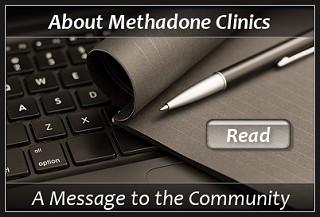|
Each methadone clinic has an administrative department whose staff set general policy, conduct billing and collection, hire employees, coordinate payroll, and oversee the operation of the business. Administration might include the organization's CEO, Human Resources staff, Finance Dept. personnel, and other managers or directors with specific job responsibilities. A key function of clinic administrators is to secure funding and/or to design & implement a business model that will sustain the clinic through varied economic times. Most of these activities go on behind-the-scenes and are not readily visible to the clinic's clients or to outside parties. However, these administrative tasks are critically important to the daily operation of the methadone clinic, its ability to serve the public, and its long term viability. The administrative arm also helps to insure that the clinic complies with State and Federal laws, meets the external mandates and guidelines of funding sources, and maintains standards of care as outlined by official accreditation bodies such as CARF and JCAHO. Someone must track, and verify, the credentialing requirements for the various professional staff employed to deliver the clinic's medical and clinical services. This is often a tedious, but important, administrative task that requires careful attention to detail & time lines in order to keep all service delivery professionals authorized to provide care. Administrative departments constitute a significant expense to any methadone clinic, but they are essential to its operation. Administration is a multi-faceted mechanism that helps to bring the different parts of the clinic together into a cohesive whole. Furthermore, they may incorporate marketing & funding initiatives that promote and grow the clinic's outreach into the surrounding community. |
At the core of every methadone clinic is the medical department, which typically consists of at least one staff physician and one or more nurses. Within the nursing core, there exists at least one RN (registered nurse) and possibly several LPN's (licensed practical nurse). Medical services offered are both general, and specific, to the requirements of running a methadone program. Methadone is a controlled substance that must be dispensed by a nurse. It must be kept locked for 24 hour security purposes, and is often stored in a safe guarded by security cameras and a monitored alarm system. The medical department is responsible for the dispensing of methadone, and a wide range of other ancillary services. Dosage increases and reductions, detoxes, physicals, blood draws, serum level checks & labs, and many more services get coordinated through the clinic's medical department. Many clinics have urinalysis testing also covered under the medical department although this sometimes falls under the clinical services division. Medical staff must be well versed on methadone potency & effects and common drugs of abuse. They must be knowledgeable on possible medication interactions and contraindications. The induction process with methadone is one which requires careful monitoring in the early phase. Consequently, medical staff must be attuned to client responses to methadone and able to accurately gauge if a client is acclimating safely to their methadone dose. Nursing staff must also be equipped to recognize when a client may be experiencing psychiatric crisis, and able to mobilize other professionals to intervene should the need arise. Often, the medical staff wear many hats in a methadone clinic and are in a unique position to observe clients daily, for months at a time, and even years at time. This direct client contact acts as a valuable source of information for the treatment team in determining how a client may be progressing on a day-by-day basis. |
The clinical services section of the methadone clinic is the counterpart & compliment to the medical services branch. Clinical functions include providing psycho-education, and various forms of counseling, which are used to help clients acquire skills that will support a drug free lifestyle and other important goals. Clinical staff have training & experience in individual and group counseling, and are knowledgeable on substance abuse and recovery issues, as well as having a working knowledge of other co-occurring disorders. Clinicians are equipped to perform clinical intakes, develop individualized treatment plans, provide case management & referral, and are able to generate required documentation for clinical services provided to each client. All methadone programs have client requirements for participating in some level of formal treatment in addition to receiving daily methadone medication. These requirements are reduced as clients demonstrate progress with treatment and greater stability in their lives. Treatment sessions are typically built on a combination of individual and group counseling although the exact blend varies from clinic to clinic. The methadone program will usually provide a series of didactic educational sessions on specific addiction & recovery topics. The methadone program counselor will provide the majority of the activities described above. Each methadone clinical department will be headed by a clinical supervisor or lead counselor. This individual's role is to provide on-site guidance and supervision to other clinical staff, and to coordinate activities as they pertain to the clinical department specifically. Also common to most methadone treatment programs is an internal review committee (which may meet weekly) to address special client issues such as relapse, client grievances, treatment planning, awarding of privileges, and development of client contracts for behavior change. |

 Methadone Clinic Administration
Methadone Clinic Administration Methadone Clinic Medical Department
Methadone Clinic Medical Department 
 Methadone Clinic Clinical Services
Methadone Clinic Clinical Services